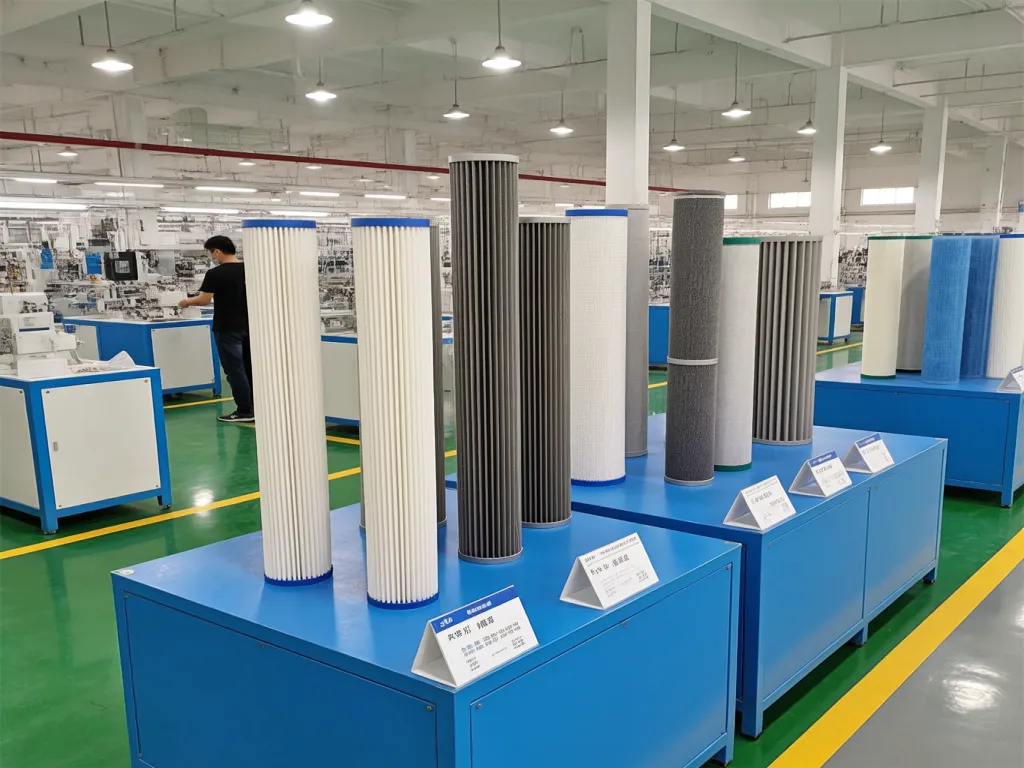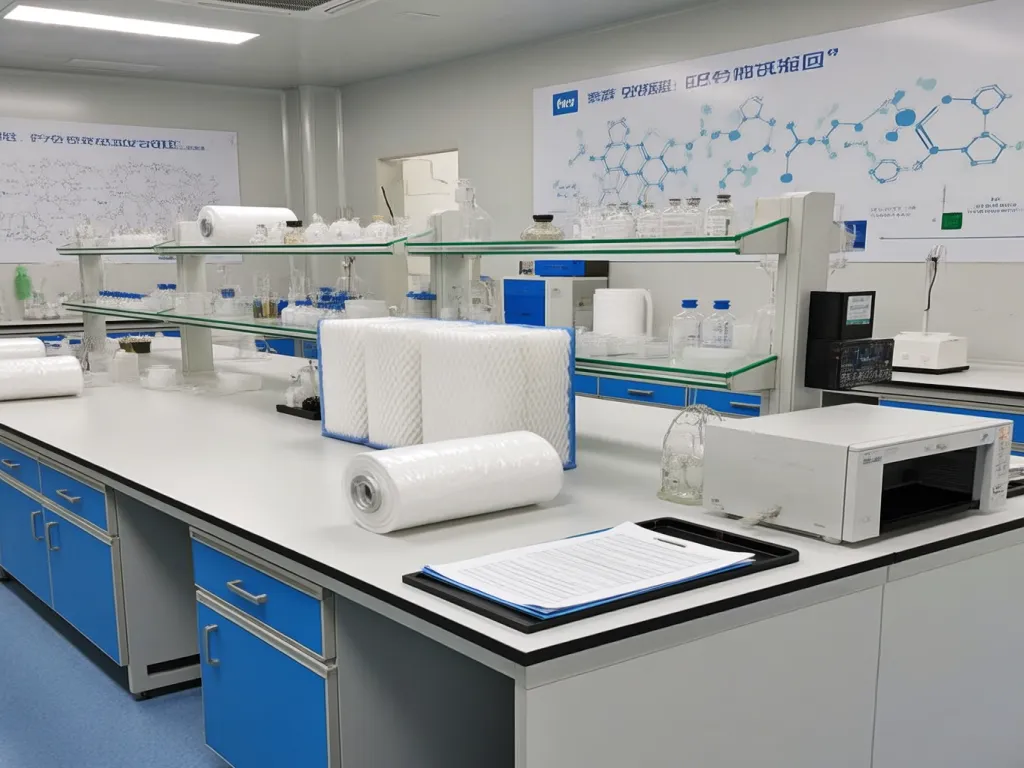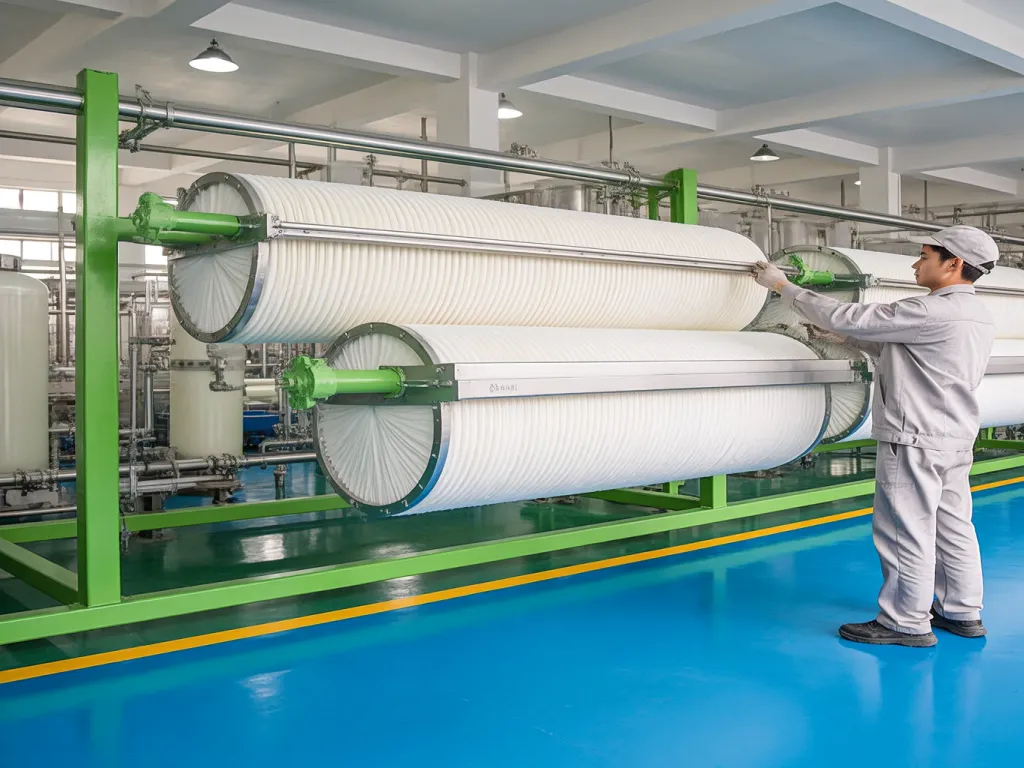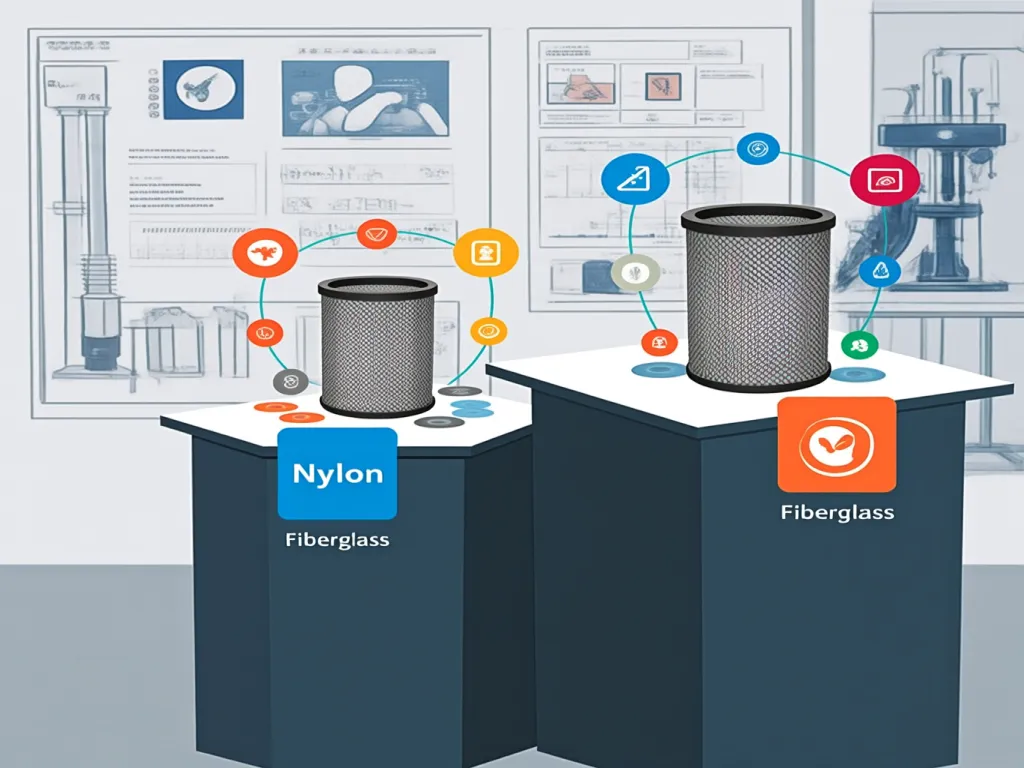Material Matters: Pick Your Perfect Custom Industrial Filter Bag

In the industrial world, every detail counts—especially when it comes to filtration. Whether you’re in chemical processing, food manufacturing, or water treatment, the material of your custom industrial filter bag can make or break your operation. But how do you know which material is the best fit for your specific needs? Let’s dive into the nitty-gritty of filter bag materials and uncover the secrets to selecting the perfect one for your industrial applications.

Polyester Fiber Material: Analyzing Its Chemical Resistance, Tensile Strength, and High-Temperature Stability, and Exploring Its Application Advantages in Chemical and Pharmaceutical Industries
When it comes to custom industrial filter bags, the choice of material can make or break your filtration system’s performance. Among the myriad of options available, polyester fiber stands out as a powerhouse, especially in demanding industries like chemicals and pharmaceuticals. So, what makes polyester fiber the go-to choice for these sectors? Let’s dive into its chemical resistance, tensile strength, and high-temperature stability, and see how these properties translate into real-world advantages, particularly when considering high-efficiency solutions like industrial filter bags for dust collection and liquid filtration.
First off, polyester fiber’s chemical resistance is nothing short of impressive.
In the chemical industry, where filters are constantly exposed to a variety of corrosive substances, polyester’s ability to withstand acids, alkalis, and solvents without degrading is a game-changer. Imagine a scenario where your filter bag needs to handle a mix of sulfuric acid and sodium hydroxide. With polyester, you can rest assured that your filter won’t dissolve or weaken over time, ensuring consistent performance and reducing the need for frequent replacements. This chemical resilience not only saves you money but also minimizes downtime, keeping your production line running smoothly.
But chemical resistance is just one piece of the puzzle.
Tensile strength is equally crucial, especially when dealing with high-pressure filtration systems. Polyester fiber boasts excellent tensile properties, meaning it can withstand significant pulling forces without tearing or stretching. This is particularly important in pharmaceutical applications, where filters must maintain their integrity under the stress of high-speed processing and precise filtration requirements. With polyester, you get a filter bag that can handle the rigors of your operation, ensuring that even the smallest particles are captured without compromising the bag’s structural integrity.
Now, let’s talk about high-temperature stability.
In many industrial processes, temperatures can soar, putting filters to the test. Polyester fiber shines in this regard, maintaining its shape and performance even at elevated temperatures. Whether you’re dealing with hot gases in a chemical reactor or sterilizing equipment in a pharmaceutical facility, polyester filter bags can handle the heat. This thermal stability reduces the risk of filter failure due to thermal expansion or contraction, ensuring that your filtration system operates reliably under extreme conditions.
So, how do these properties translate into application advantages?
In the chemical industry, polyester’s chemical resistance and tensile strength make it ideal for filtering corrosive liquids and gases, as well as handling abrasive slurries. Its ability to withstand high temperatures also makes it suitable for processes involving thermal treatments or sterilization. In the pharmaceutical sector, polyester’s combination of properties ensures that filters can meet stringent hygiene and purity standards, capturing even the tiniest contaminants without compromising product quality. For those seeking a durable and efficient solution, exploring options like high-efficiency industrial filter bags can provide further insights.
But don’t just take our word for it.
Consider the real-world impact: a pharmaceutical company that switched to polyester filter bags reported a 30% reduction in filter replacement costs and a 20% increase in production efficiency. Why? Because polyester’s durability and reliability meant fewer interruptions and less waste. Similarly, a chemical plant that implemented polyester filters saw a significant decrease in maintenance downtime, as the filters required less frequent cleaning and replacement.
In conclusion
polyester fiber’s chemical resistance, tensile strength, and high-temperature stability make it a top choice for custom industrial filter bags in the chemical and pharmaceutical industries. Its ability to withstand harsh conditions while maintaining performance translates into cost savings, increased efficiency, and improved product quality. So, if you’re looking for a filter material that can handle the demands of your industrial operation, polyester is definitely worth considering. Have you ever wondered how much more efficient your filtration system could be with the right material? With polyester, the answer might surprise you.

Polypropylene Fibers: Lightweight, Cost-Effective, and Efficient for Cost-Sensitive Industries
When it comes to selecting the right material for your custom industrial filter bag, polypropylene fibers stand out as a top choice—especially if you’re operating in cost-sensitive sectors like food processing or water treatment. Why, you ask? Let’s dive into the details. First off, polypropylene is incredibly lightweight. This isn’t just about making your filter bags easier to handle (though that’s a nice perk). The lightweight nature of polypropylene means less strain on your filtration systems and easier installation. Imagine replacing heavy, cumbersome filters with ones that are a breeze to manage. Sounds appealing, right? But the real magic of polypropylene lies in its cost-effectiveness. For industries where every penny counts, polypropylene offers an unbeatable combination of affordability and performance. You don’t have to break the bank to get a filter bag that does the job well. In fact, polypropylene filter bags often provide a better return on investment compared to more expensive alternatives. How? By balancing initial costs with longevity and maintenance expenses. Now, let’s talk about filtration efficiency. Polypropylene fibers are designed to trap particles effectively, ensuring your processes run smoothly. Whether you’re filtering out impurities in water treatment or separating solids in food processing, polypropylene delivers consistent results. Its fibrous structure creates a dense network that captures even the smallest particles, preventing them from slipping through. But wait, there’s more. Polypropylene is also resistant to many chemicals, making it suitable for a wide range of applications. You won’t have to worry about the material degrading when exposed to certain substances, which is crucial in industries where chemical resistance is a must. So, where does polypropylene shine the brightest? In cost-sensitive sectors like food processing and water treatment. These industries demand high-performance filtration without the hefty price tag. Polypropylene fits the bill perfectly, offering a reliable solution that won’t drain your budget. Let’s take a closer look at food processing. In this industry, maintaining hygiene and preventing contamination are paramount. Polypropylene filter bags are easy to clean and sanitize, reducing the risk of bacterial growth. Plus, their chemical resistance ensures they won’t react with food products, preserving taste and quality. Water treatment is another area where polypropylene excels. Municipal water treatment plants and industrial facilities alike rely on efficient filtration to remove contaminants. Polypropylene’s ability to handle various particulates and its resistance to chemicals make it an ideal choice for these applications. And because it’s cost-effective, you can scale your filtration systems without worrying about excessive costs.
Lightweight Advantage
The lightweight nature of polypropylene fibers is a game-changer in industrial filtration. It reduces the overall weight of the filter bag, making it easier to handle and install. This is particularly beneficial in large-scale operations where multiple filter bags need to be managed. Less weight also means less strain on filtration systems, potentially extending their lifespan and reducing maintenance costs. Imagine the difference between lifting a heavy, bulky filter bag and a lightweight, easy-to-manage one. The latter not only saves time but also minimizes the risk of injuries during installation and replacement.
Cost-Effectiveness Unveiled
Cost is a critical factor in any industrial operation. Polypropylene fibers offer an affordable alternative to more expensive materials without compromising on performance. The initial cost of polypropylene filter bags is often lower than that of other materials, and their durability ensures they last longer, reducing the need for frequent replacements. Additionally, polypropylene’s resistance to chemicals and wear means less downtime and lower maintenance expenses. When you factor in these savings, polypropylene becomes an even more attractive option for cost-sensitive industries.
Filtration Efficiency Explained
Efficiency is key in industrial filtration, and polypropylene fibers deliver on this front. Their fibrous structure creates a dense network that effectively captures particles, ensuring clean and consistent filtration. This is crucial in industries like food processing and water treatment, where the quality of the filtered product directly impacts safety and compliance. Polypropylene’s ability to handle a wide range of particulates, from fine dust to larger debris, makes it a versatile choice for various applications. Its chemical resistance further enhances its filtration capabilities, allowing it to perform reliably even in harsh environments.

Other Material Comparisons: Nylon, Fiberglass, and Beyond
When it comes to selecting the perfect material for your custom industrial filter bag, the options extend far beyond polyester and polypropylene. Each material brings its own set of advantages and limitations, tailored to specific industrial demands. Let’s dive into the characteristics of nylon and fiberglass, two materials that frequently find their way into industrial filtration systems, and explore how they can meet your unique needs. For a deeper understanding of how these materials can enhance your filtration systems, you may want to explore our high-efficiency industrial filter bag solution.
Nylon: The Resilient All-Rounder
Nylon, a synthetic polymer, stands out for its remarkable strength and durability. It’s known for its high tensile strength, meaning it can withstand significant pulling forces without breaking. This makes nylon an excellent choice for environments where the filter bag might encounter mechanical stress or abrasive particles. But nylon’s benefits don’t stop there. One of the key features of nylon is its resistance to wear and tear. It can endure repeated use and cleaning cycles without losing its structural integrity, making it a cost-effective option in the long run. Additionally, nylon has good chemical resistance, though it’s not as impervious as some other materials to certain aggressive chemicals. However, for many industrial applications, such as in the automotive or textile industries, nylon’s chemical resistance is more than adequate. Nylon filter bags are particularly suited for applications involving high flow rates and where the filtration media needs to maintain its shape under pressure. For instance, in air filtration systems where the bag needs to capture fine dust particles without clogging, nylon’s resilience ensures consistent performance. Moreover, its ability to withstand temperatures up to around 200°C (392°F) makes it a viable option for moderate-temperature industrial processes.
Fiberglass: The High-Temperature Specialist
Fiberglass, on the other hand, is the go-to material when it comes to handling extreme temperatures. Composed of fine glass fibers, this material can withstand temperatures well above those that nylon or polyester can endure, often up to 500°C (932°F) or more. This makes fiberglass filter bags indispensable in industries like metal processing, incineration, and cement production, where the filtration process involves very high temperatures. Beyond its heat resistance, fiberglass also offers excellent chemical stability. It’s resistant to most acids, alkalis, and organic solvents, making it suitable for harsh chemical environments. However, fiberglass does have some drawbacks. It’s more brittle than nylon or polyester, meaning it can crack or break under mechanical stress. This limits its use in applications where the filter bag might be subject to bending or impact. Fiberglass filter bags excel in capturing fine particulates, thanks to their small fiber diameter and high surface area. This makes them ideal for applications like coal-fired power plants, where the goal is to capture extremely fine ash particles. Additionally, their ability to maintain their structure at high temperatures ensures that the filtration process remains efficient even under extreme conditions.
Choosing the Right Material for Your Needs
So, how do you decide between nylon, fiberglass, or another material for your custom industrial filter bag? It all comes down to understanding your specific industrial requirements. Ask yourself: What temperatures will the filter bag be exposed to? What kind of chemicals or particulates will it need to filter? How much mechanical stress will it endure? If you’re operating in a moderate-temperature environment with a need for durability and chemical resistance, nylon might be your best bet. On the other hand, if your processes involve extreme heat and you need a filter bag that can withstand it without losing its shape or efficiency, fiberglass is the way to go. Remember, the right material can significantly enhance the performance and lifespan of your custom industrial filter bag. By carefully considering your industrial needs and the unique properties of each material, you can make an informed decision that ensures optimal filtration and cost-effectiveness.
Selecting the right material for your custom industrial filter bag isn’t just about durability—it’s about optimizing performance for your specific industrial needs. From the chemical resilience of polyester to the cost-efficiency of polypropylene, each material offers unique advantages. By understanding these differences, you can make an informed decision that boosts your operational efficiency. Ready to take the next step? Explore our range of custom industrial filter bags and connect with our experts for tailored solutions that fit your requirements perfectly. What material will you choose for your next filter bag upgrade?

